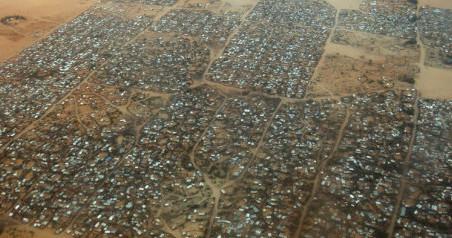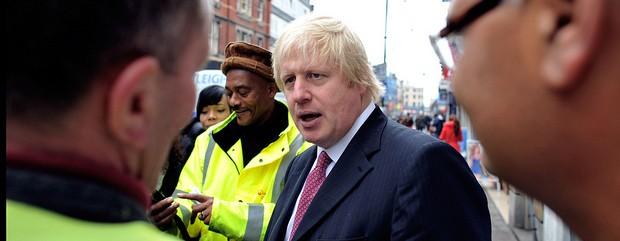Politics not Refugees at heart of Repatriation to Somalia – By Ben Rawlence

 Last week I was in Dadaab refugee camp when the World Food Programme, in the midst of a budget crisis, took the unprecedented step of cutting by 30% the food rations that it distributes twice a month to the 400,000 refugees living in the camps. Outside the food distribution centre – a row of huge warehouses full of rice, flour and oil – an angry crowd shook their half-empty plastic sacks at me. They took me, a white man, for a representative of the United Nations and thus responsible for their plight.
Last week I was in Dadaab refugee camp when the World Food Programme, in the midst of a budget crisis, took the unprecedented step of cutting by 30% the food rations that it distributes twice a month to the 400,000 refugees living in the camps. Outside the food distribution centre – a row of huge warehouses full of rice, flour and oil – an angry crowd shook their half-empty plastic sacks at me. They took me, a white man, for a representative of the United Nations and thus responsible for their plight.
‘These camps are not safe and now you take away the only thing that is good? The food?’ An old man with one tooth and milky eyes wagged his finger at me. ‘We will go back to Somalia, and then we will return here, but when we return we will not be refugees, we will be al-Shabaab and we will come for you.’
This weekend, the governments of Kenya, Somalia and the UN Refugee Agency signed a tripartite agreement for the repatriation of Somali refugees. There are an estimated 1 million Somali refugees in Kenya, 400,000 of them in the Dadaab refugee camps.
Let us be clear, this is an agreement driven more by politics than by an assessment of the situation on the ground. It is a game of make-believe. Both governments are desperate for there to be peace in Somalia, but neither, despite their foreign financing and the support of 18,000 African Union troops, can defeat the rebel group al-Shabaab. So instead, they focus on the cosmetics of peace – repatriation of the refugees. Britain, as a lead booster of the idea of peace in Somalia and vested in the outcome because of the London conferences, shares some of the blame for the forcing of the pace.
To the refugees, living in the overcrowded, insecure and now, food-scarce camps, the double whammy of the ration cut plus the repatriation announcement seems like a conspiracy theory to force them back over the border.
Yes, there have been some improvements in some parts of Somalia in the last year – al-Shabaab was pushed out of Mogadishu in 2011 by African Union forces and out of Kismayo by the Kenyan army, they have not gone away. Rather, they have gone underground; attacking international and government targets in Mogadishu on an almost weekly basis and still controlling all of southern Somalia apart from a couple of enclaves.
‘We are sending out a signal that normalcy is returning to our country,’ crowed Somalia’s foreign minister upon the signing of the agreement. Nonsense. The puppet administration kept afloat with US and European money is in crisis and the largest share of territory still belongs to al-Shabaab.
Nonetheless, an estimated 80,000 refugees in Kenya have already gone back to Somalia since the end of the terrible famine in 2011. And more are going every week. The agreement means now that those who go will be able to get US $200 per person to assist them with the costs of travel and reintegration back home. This is welcome news to the refugees. But the majority of people who return as a result of this agreement will be going to areas of southern Somalia that are under the control of al-Shabaab.
They will be going because life is better there than in the camps riven with rape, gang-violence and now, again, hunger. Because al-Shabaab provides law and order, an intolerance for corruption and a fair economy. People don’t like the restrictions on dress, behaviour and the forced prayer, but it is a price they are willing to pay. They will be going because life in the camps is intolerable, not because Kenya and Somalia have declared that there is peace back home.
Ben Rawlence is an Open Society Fellow working on a book about Somali refugees and the author of Radio Congo: Signals of Hope from Africa’s Deadliest War







[…] Last week I was in Dadaab refugee camp when the World Food Programme, in the midst of a budget crisis, took the unprecedented step of cutting by 30% the food rations that it distributes twice a month to the 400,000 refugees living in the camps. […]
I agree with the article, its basically politics and i don’t repatriating the refugees will bring any peace into both countries. It may worsen.
I agree with the article, its basically politics and i don’t think repatriating the refugees will bring any peace into both countries. It may worsen.
There is a history of putting various forms of pressure on refugees to choose voluntary repatriation after these kinds of tripartite agreements. In the wake of the 2005 CPA in the Sudans, camp officials in Kakuma (Kenya) closed secondary school enrollment to South Sudanese students in an effort to encourage refugees to return to South Sudan. The assumption was that people were staying in the camp for education, rather than because they did not yet feel confident to return to a still very insecure situation (as a UNHCR official readily admitted in an interview). This did push some people to leave, but many more stayed. And of those that left, many ended up back in the camp because of ongoing insecurity a year or two later.
I strongly support the voluntary repatriation. who will bring the peace in Somalia? if we stayed Kenya. We Somalis should back our country and rebuild it and I believe there is a security challenges in refugee camps including rape.
Why we are fear Alshabaab since they are our children we should discuss our problems.
I have requested voluntary repatriation from UNHCR but they seems not reluctant.